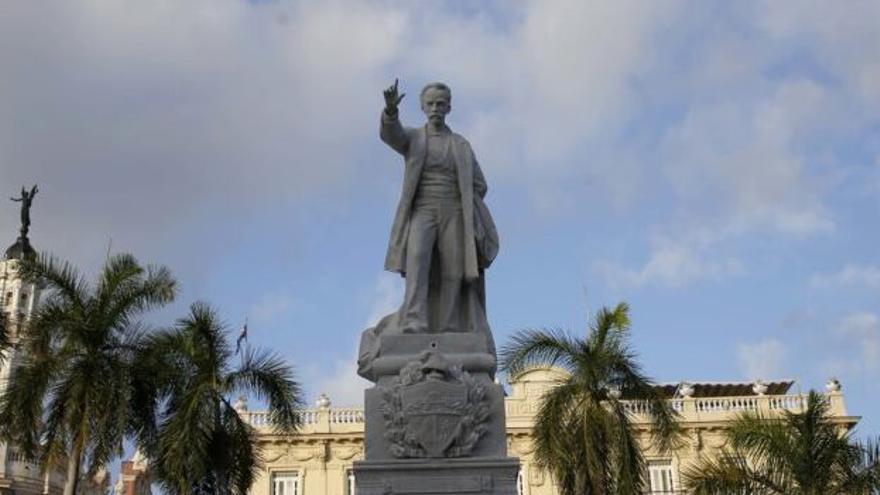
![]() 14ymedio, Pedro Corzo, Miami, 28 January 2024 — To mark an anniversary of the birth of the most notable of all Cubans, Jose Martí (January 28, 1853), many of us who honor that gentleman do everything possible to remember such a great date, based on an unwritten commitment that we have contracted.
14ymedio, Pedro Corzo, Miami, 28 January 2024 — To mark an anniversary of the birth of the most notable of all Cubans, Jose Martí (January 28, 1853), many of us who honor that gentleman do everything possible to remember such a great date, based on an unwritten commitment that we have contracted.
That tradition was partly carried out by the Pen Club of Cuban Writers in Exile, chaired by the writer Luis de la Paz, celebrated with the participation of Santiago Cárdenas and Emilio Sánchez, two notable intellectuals who have a profound knowledge of Martí’s work. Both were assisted by two other great admirers of the apostle, Julio Estorino and Sara Martínez Castro, who read Martí’s poems.
Martí’s first action in his struggle for independence is not associated with war, as happened with most of our heroes. His activities began by publishing writings against Spain and by calling a fellow student who had enlisted in the Spanish Army to fight the Mambises of the Ten Years’ War a traitor. For that reason he went to prison and was later exiled to Spain.
It must be recognized that most of the notable personalities who fought for the independence of Spain, members of a glorious and abundant heritage in which Simón Bolívar and Jose de San Martin stand out, patricians of strong national convictions, leadership and indisputable military talent, left indelible traces by establishing the foundations of several republics in the hemisphere.
Martí, we all know, was not a warrior but, by far, the most important promoter of Cuba’s independence from Spain
That glorious group is mainly made up of men of arms. However, we must include other heroes who, although they did not stand out for their talent as warriors, were great thinkers and efficient organizers, capable of cementing new republics, as was the case of José Martí, a hero whose life’s work led Cuba to independence.
Martí, we all know, was not a warrior, but, by far, the most important promoter of Cuba’s independence from Spain and the most notable organizer of the “just and necessary war,” an expression which shows that he conceived of military conflict as the only way to achieve emancipation of the homeland.
He fell in his first fight, facing the sun, as he had requested in his Versos Sencillos, contrary to the most distinguished military leaders in the hemisphere who did not die in the heat of the battle. His death in Dos Ríos, at only 42 years old, left the Cuban independence fighters orphaned by their most lucid thinker, the only man, as history has shown, capable of working in a republic “with everyone and for the good of all.”
Despite his early death, he left a vast and profound work that remains current and valid. Reading Martí in the present is to access a fresh and contemporary knowledge. All his work exudes sensitivity and neighborly love, as he wrote in another simple verse: “I cultivate a white rose in July as in January, for the sincere friend who gives me his hand freely, and for the cruel one who tears out the heart with which I live, neither thistle nor arugula do I grow, I cultivate a white rose.”
Reading Martí in the present is to access a fresh and contemporary knowledge, which is that all his work exudes sensitivity and neighborly love
Martí’s thought is deeply human. “There is no better homeland, Cubans, than the one that is won with one’s own effort. The foreign sea is made of blood. No one loves or forgives if not our country,” he wrote.
Martí’s work retains relevance and validity. It has not lost strength; it has not aged; it remains as vibrant as ever. “Whoever wants a secure homeland must fight for it. Whoever doesn’t will live under threat of whip and banishment, considered a wild beast, thrown from one country to another, smiling before charity, earning the disdain of free men and the death of his soul.”
And in these times in which the fragmentation of our rights and the respect that both minorities and majorities deserve are appreciated, what is better than this: “Man does not have any special rights because he belongs to one or another race; call him a man and all his rights are already given. The black man, by being black, is not inferior or superior to any other man: the white man who calls me a black man sins by being redundant; the black man who calls me a white man sins by being redundant. Everything that divides men, everything that specifies, separates or encloses them, is a sin against humanity.”
Translated by Regina Anavy
____________
COLLABORATE WITH OUR WORK: The 14ymedio team is committed to practicing serious journalism that reflects Cuba’s reality in all its depth. Thank you for joining us on this long journey. We invite you to continue supporting us by becoming a member of 14ymedio now. Together we can continue transforming journalism in Cuba.
